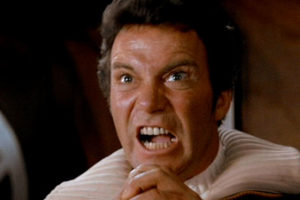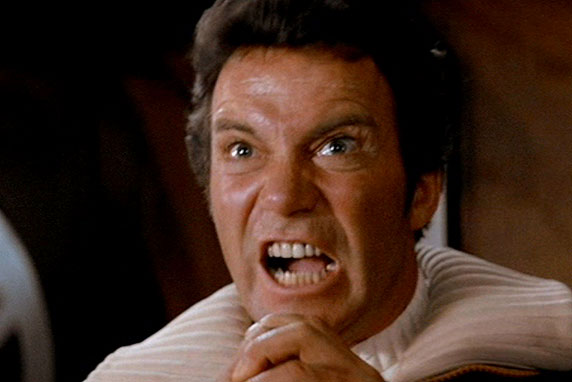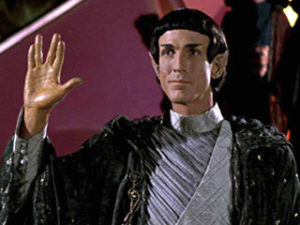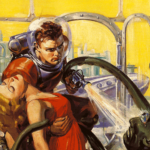Star Trek Into Fun Yet Generic and Derivative Darkness
Often I like movies people detest. Disney’s Treasure Planet (2002), which gloried in “steampunk” before it was cool? Love it. Superman Returns (2006)? Still love it (though I also anticipate Man of Steel). Spider-Man 3? Had its goofy moments, but I like it all right.
This time I can’t be as positive about Star Trek Into Darkness.
No, I’m not surprised that plenty of people like the film as a fine and fun action flick. I liked it that way also. As with Star Trek (2009), the cast and effects are brilliant, the story simple yet interesting enough and, most of the time, unpredictable.
1. Into Derivatives1
But evidently this time, the writers themselves thought so poorly of their work that yes, they felt they must go where multiple previous Star Trek films had gone before.2
Notice I said multiple. I don’t suggest that Into Darkness merely rips off Star Trek II: The Wrath of Khan. Instead its writers must have decided that previous Wrath of Khan callbacks in Star Trek (2009) were not enough — or that similar callbacks even in Star Trek: First Contact (1996) or Star Trek: Nemesis (2002) didn’t get the job done.
But there is a difference. Those films had callbacks, echoes, references. Captain Picard in First Contact goes on his Captain Ahab-like vengeance against the Borg who assimilated him. And in both Nemesis and in Star Trek, actually, our heroes face the wrath of a vengeful Romulan captain with an impossibly giant and high-tech starship. Sounds familiar? Those do work in their separate movies, I suggest. But it may be that folks who seem to praise Into Darkness for its villain haven’t seen those earlier films and don’t know of the callbacks.
Into Darkness is different. How come? Because its writers wrote memo points akin to these. Really, these are the actual unedited memos, edited to insert only my imaginary questions.
Q. Why have yet another vengeful-captain Star Trek movie?
A. Those three vengeful-captain stories, already similar to Wrath of Khan, were not enough.
Q. Meaning … ?
A. Let’s revert to the source of all those callbacks/echoes/tributes, fanfiction-style.
Q. Why would we do that? Aren’t there other themes and “darknesses” to explore?
A. (Ignoring question.) While we’re at it, let’s remake word-for-word, theme-for-theme, a certain famous Sacrificial Death scene from WoK — only “subverted,” sort of.
Q. “Subverted” how?
A. By switching the roles of two heroic characters.
Q. How is this “subversion”? It sounds more like a stunt.
A. Well, it comes across as new and creative, but anyway, that scene and the separation by Plexiglass what people remember from Star Trek. That and “warp speed” and “beam me up, Scotty.” It’s a tough media landscape; we must focus on what people remember, or say they remember, from a time when the landscape wasn’t nearly so cluttered.3
Q. Any other “subversions” you have in mind?
A. We shall have someone yell a villain’s name real loud. And not who you’d expect.
Q. You’re joshing. How is that creative? Can’t we explore more on other themes from earlier in the film, such as when Spock mind-melds with a dying man and can later empathize with those emotions? That builds on previous Trek, without ripping it off.
 A. Come on. People remember that yell. It’s famous. We want to tap into that nostalgia.
A. Come on. People remember that yell. It’s famous. We want to tap into that nostalgia.
Q. First, this is blatant “fan-service” on the level of bad fan-fiction. Secondly, you do realize that the yell is particularly famous as an internet meme, right? Put that into a dramatic scene — even a derivative one — and it will cause cognitive dissonance.
A. But it’s memorable. We need some way to get people to look up from their cell-phones in the theater and actually pay attention to the movie they paid nearly $10 to see.
Q. Why do people do that anyway? They paid $10 plus concessions. They waited in line. And they have to be pried away from their preciousss with four stern warnings onscreen plus offers to put your phone in Theater Mode and get coupons later.
A. Yes. It’s sick.
Q. Maybe the next Star Trek film could explore that theme. It’s something Trek has not touched on before, not in our connection-addicted society. Seeing as how you’re so determined to recast Memorable Villains, you could even bring in the Borg early.
A. (Mind blown.)
2. Into ‘Distractism’
That’s my critique of the derivative story — which admittedly, comes only in the film’s last half after a better, more-promising start. But to me, it sent the ship plunging out of orbit.
What about the wonder? I missed that. More of it was present in the first film, though even there I missed that sense of wondrous — and even childish — humanism that Star Trek’s creators explored in the series. All that’s gone. All style, no substance — save for the micro-sermon at the film’s end that attempts to slap on a generic we-must-reject-revenge moral.
Yes, you heard right. A Christian would prefer more humanistic morals in a Star Trek story.
Whatever for?
Because humanism has some kind of substance. It’s the wrong substance, to be sure, but it includes some weight because it at least maintains traces of the imago Dei view of humans (only ignoring the Dei part) and has a heft of imagination and wonder outside ourselves.
Did Into Darkness promote anti-wonder? Not really. But without any particular views under the thing, it veers off-course into a “belief system” I’ll immediately term distractism.
Again, it’s a fun flick, but there’s just not much there when you really think about it.
That doesn’t even get started on the plot holes: “cold fusion bombs,” transporter errors, etc.
3. Into Dulled ‘Darkness’4
For a friend who enjoyed the film and insisted it didn’t come near a Wrath of Khan re-re-re-retread, I wrote these reactions. They’ll close out this little critique.5
[Friend: Oh, come on, previous films also didn’t share humanistic/philosophical wonder.]
Ah, yet even in First Contact there is that underlying wonder, that someday in the future all of Earth’s problems will be over, first contact made, and the Federation founded.
Of course, all that benefited from the established TV series.
As I think about it more, my main objections to Into Darkness were the Khan re-treading. The references were there, but no real meaning or different direction was behind them.
The appeal was of shallow fan service and not much more.
This is a particular retread without half the scope and forethought of the original. In the original, Khan was the result of attempts to better humanity in the wrong way. His strength, coupled with Kirk’s perceived weakening, made for a fantastic clash between them both with real-world personal and philosophical analogues. Khan also meant something to Kirk because of their history, going back to the TOS episode “Space Seed.”
By contrast, Into Darkness Khan was a great villain, especially as portrayed by Benedict “Smaug” Cumberbath. He was a stock villain, but a fantastic stock villain, on his own.
Ergo: this “darkness” was a dull, generic “darkness.”
He didn’t even need to be connected to the original storyline. That was what I mean by overt fan-service, also to the fanfiction level. It ends up borderline insulting.
Things went even more over-the-top when Spock actually yelled the famous yell. That was ridiculous and should have been nixed the moment some fool dared to have the idea. It has no meaning. It drags the thing dangerously close to self-parody.
And it’s even more absurd when the filmmakers already (and more subtly) tributed that by having Nero in the first rebooted film yell “SPAAAAHHHHHCCCK!”
We’ve been there, done that with Vengeful Captains.
They’d likely say this was a creative subversion of the original. “Subversion” nothing. That was just “hey, let’s put this famous painting against a mirror, see how it looks.”
It also didn’t help that the twist was telegraphed from a mile away.
That and the plot holes … eesh, they just weaken the world-building. A perfect visual of this is the exhaust now suddenly left by starships as they warp away. It’s real shiny and all, great visual, but what exactly is that exhaust made by? (Also: is it a pollutant?)
Here’s how you could have real subversion and tributes and action and darkness all at the same time: Stick with the Kirk-violates-Prime-Directive storyline. Indulge in villainy, people trying to militarize Starfleet, great effects, ‘SPLOSIONS AND OVERDRIVE, and all of those things, while delving deeper into TOS’s themes of exploring other planets and dealing with the aliens (balancing enlightened-diplomacy and cowboy-ism) when you get there.
That would have given the film more weight, tributing the substance, not only style, of what made Star Trek great.
- I shall try to keep this section and the next spoiler-free. ↩
- There, I said it. ↩
- For this observation, I am indebted to the absurdly foul-mouthed yet surprisingly in-depth observations of “Harry S. Plinkett,” in his original overall-positive review of Star Trek. ↩
- Note: Further spoilers follow. ↩
- Edited, of course. ↩














































This is why I don’t think mere entertainment is a good enough goal for storytellers in any medium. Maybe film gets a little more leeway if the entertainment value is good, because theatrics and visuals are part of the history of that medium, but it’s still not enough. The other end of the spectrum is preachiness, and that also makes for bad art.
I think Star Trek has toed the line of preachiness before, but it was best when it sincerely wrestled with the human condition, even from its humanistic worldview. The best moments of Star Trek carry a sense of hope, wonder, and conviction that are affective across the worldview barrier.
(I haven’t seen Into Darkness.)
Fan fiction.
It’s funny, that’s exactly the term I used when talking the film over with my husband after we saw it.
I think perhaps the real issue is expectations. In the theaters. In the e-books. When we enter a theater or open an e-book, we have expectations. We have hopes about what we will experience.
Ever since George Lucas rebooted Star Wars with the prequels, I approach these sorts of movies knowing a beloved story will be re-interpreted. Sometimes it’s a fun ride. Sometimes I feel the things I love have been violated and corrupted beyond enjoyment. But I enter the experience already having made the decision to enjoy it for what it is (if I can).
It reminds me of the flood of e-books now available, from every kind of author, every level of talent and skill, every level of quality and excellence. Will the story be short or long? How much am I getting for my $2.99? Will the story be fresh and original, or a blatant rehash of the typical plots or themes that new authors often tackle? Will the characters be engaging or 1/4-inch thick cardboard cutouts?
Expectations. Go into Star Trek expecting fan fiction, and you’ll have fun. Go in hoping for something more… you’ll be disappointed.
Thanks for the discussion, Stephen. Always interesting to hear someone else is picking up on similar things.
Yeah, I don’t think there’s any Trekkie who wasn’t feeling awkward during the last fifteen minutes. Somebody suggested that it could have been well-done if there was no dialog at all, and that’s something I’d be interested in seeing. The near-verbatim repeat of the Wrath of Khan dialog just…painful. But Zachary Quinto did some really great wordless acting at (spoilers) Pike’s death, so if he could have done that there, with Scotty and Uhura’s great reactions to back it up, that might have been pretty good. Whoever that was who suggested it was onto something good.
And I end up overlooking the Prime Directive violation, because I would probably need both hands and my toes to count up all the times all the series ended up violating it (Picard, I like you, but you were pretty terrible at that).
As for themes, eh, it was a better than a lot of cash–cow franchises, but I want to be able to not have to set the bar so low.
You touched on one thing that I’ve been saying since I saw the trailer, Stephen: What? Another revenge flick?
Now, granted, if carefully analyzed, Darkness isn’t necessarily a revenge piece, or just a revenge piece…but it certainly feels like it for most of the running time.
One thing I think has been completely overlooked in both of the new ST films is the sense of wonder that the universe holds, even for us earth-bound folk. What made the multiple series work week-by-week was that sense of wonder and humanities smallness and incapability to handle it alone. For all its downsides, the original Star Trek movie (TMP) captured that feeling pretty well.
Another nit that bugged me: What is the range of a pocket communicator in Abrams universe? Egads.
Well, it was probably a Nokia®™ phone, as product-placed in Star Trek (2009).
I certainly don’t object to cash cows based mainly on name recognition. After all, for every Battleship you will have a The Avengers. Even cash cows can yield especially fine beef, suitable for steak or at least gourmet cheeseburgers.
However, a corollary with cash-cow filmmaking is that you are already trying to fight audience distraction, by other movies and media (even in the very theater). If that is your Prime Directive, then you must not violate it. “Distractism” is established as this filmmaking Federation’s guiding principle. So wonder will not do.
It keeps saying I haven’t typed anything into the comment box…
Fixed, for now at least
had problems getting this comment accepted)
And they have to be pried away from their preciousss with four stern warnings onscreen plus offers to put your phone in Theater Mode and get coupons later.
Snickers. Love it. Though would I lose my geek card for admitting I haven’t sat through a complete episode of ANY Star Trek series yet?*
What would the fans here recommend to start with?
*but I am 20 episodes away from completing Classic Who. 696-20= Bonus geek points!
Well, I’m not a hardcore Trekkie, but even I can tell you where not to start, if you don’t want your first impression to based on catching the franchise with its pants down. Don’t start with the first season of The Next Generation. It was really quite a bad season.
I don’t know where to start. I grew up watching my father watch reruns, so I never really had to pick a starting point. My the movies based on the original series? I like Deep Space Nine the best, but I can’t say whether or not the first season of that show would be accessible to someone not already familiar with the franchise. It is somewhat tied-in with The Next Generation.
I recommend this blog that has a lot of thorough reviews of individual episodes: http://them0vieblog.com/
I don’t think the first season of STNG was its best by a long shot, but it was good enough to catch enough readership to reboot the franchise and turn it into a seven season run with two successful spinoffs. I jumped in around the 3rd episode of the first season and was hooked. Rarely missed an episode. It did take them a few episodes to get their footing and feel comfortable, though.
Where to start? Logically, I’d start with the classic series and work your way up. Everything is founded on that series. While dated, they are fun. My son watched with me the beginning of “Space Seed” (thought I’d refresh myself on the original Kahn episode) and at the beginning of it they talk about the Eugenics war that happened in the 1990s. My son quickly asked me, “When was this made?” “1968” “Oh.” lol.
My favorite comment about the film so far is that “J.J. Abrams is the Fake Geek Girl we were all warned about.”
In other words, Abrams has no idea what made the original Trek work, he knows little about the Trek franchise beyond the superficial, and he doesn’t even really like what Trek stands for (he has admitted this himself, in so many words, when he confessed to not enjoying Trek as a kid and finding it “too philosophical”).
I actually like a lot of Abrams’ oeuvre (Alias especially, which in its first two seasons was brilliant) and the concepts he comes up with on his own. I even enjoyed the first Star Trek film he made, to the point where I’d gladly watch it again sometime. But after the reviews I’ve read of STID, including this one, I’m starting to have grave doubts about his ability to make anything worthwhile out of an existing franchise. Which bodes ill for the next Star Wars movie, as well…
Although admittedly, it’s hard to imagine anyone making a worse hash of that particular fictional universe than George Lucas himself did.
I enjoyed the movie, but then I expected it to be fanfic and derivative. And what you called a stunt, I called an inversion.
Quibbles, yeah, lots and lots, mentioned some of them on my blog. Still, it was a lot of fun.
And for the record, I have never liked womanizing, swaggering Kirk or the stupid Prime Directive.
Up until now I felt generally positive about Star Wars VII. Now I’m beginning to worry….
Thanks for the info. I’ll wait for the DVD to come out and watch it with ClearPlay (same as I did with ST 2009).
Just remember JJ did Lost in which he got lost and kept retreading the whole show. ;P
Interestingly, I just returned from watching the movie. I agree, the revenge thing is overplayed in ST it seems. But if done well, that part didn’t bother me. On the whole I enjoyed it, but when I saw Kirk ready to go into the radiation chamber to save the ship, I said to myself, “No, they’re really not going to go there, are they?” Yep. In my opinion, though it was done well enough, that distracted from the rest of the movie. The reason that worked in the “Wrath of Kahn” was because it was original and unexpected. Retreading it is neither. Just one of those things you can’t do more than once.
And can someone tell me why they had a tribble? That just popped up out of nowhere. I’m thinking a “super tribble” might be more of a danger to the ship than Kahn. lol.
I enjoyed the movie, but that’s probably because I didn’t recognize the derivitave parts. I’m too young to have memories of the original Star Trek, and missed the family movie night where we watched Wrath of Khan. My sister saw it, and figured out what was happening, but I was blissfuly unaware and able to enjoy the story.
I enjoyed the movie, though I admit to wincing during the retreaded death scene…it seemed to me to cheapen the original…after all, if Kirk did it first, then it wasn’t such an original sacrifice, was it? I was sorry about that.
I also kept getting confused: is this set BEFORE all the other films, or AFTER? I kept asking myself, and having to stop and think. I think they didn’t do a good job of being careful about making the technology seem less developed than earlier films, which ought to have been somewhat of a prime consideration.
Spock was way too emotional and risk-taking. So the question is: did he grow MORE logical as time went on, or less? The original series and the first films seem to indicate that he started out very logical, but learned to handle a balance between emotion and logic as the story progressed. But that progression is not seen in this film.
But as I said, I enjoyed the movie until I started reading reviews that pointed out it’s flaws. I sadly agree with most everything Stephen said. I may watch the film again just to see Cumberbatch do his awesome thing, but it won’t be because I’ll be caught up in the story.
Esther, it’s neither before nor after, in a way. In ST09, Nero went back in time (chasing Old Spock) and changed history from the day of Kirk’s birth onwards. The theory is that Nero’s attack on the Kelvin triggered a faster development of tech than actually occurred in the original timeline. That’s what they mean by reboot – the new movies are free of canon events. Alternate timeline, parallel universe, whatever you want to call it. And the only one who lived through the original canon is Old Spock. Whether that timeline actually happened is anyone’s guess. Is it still going on out there in the multiverse somewhere? Wish I knew… 😛